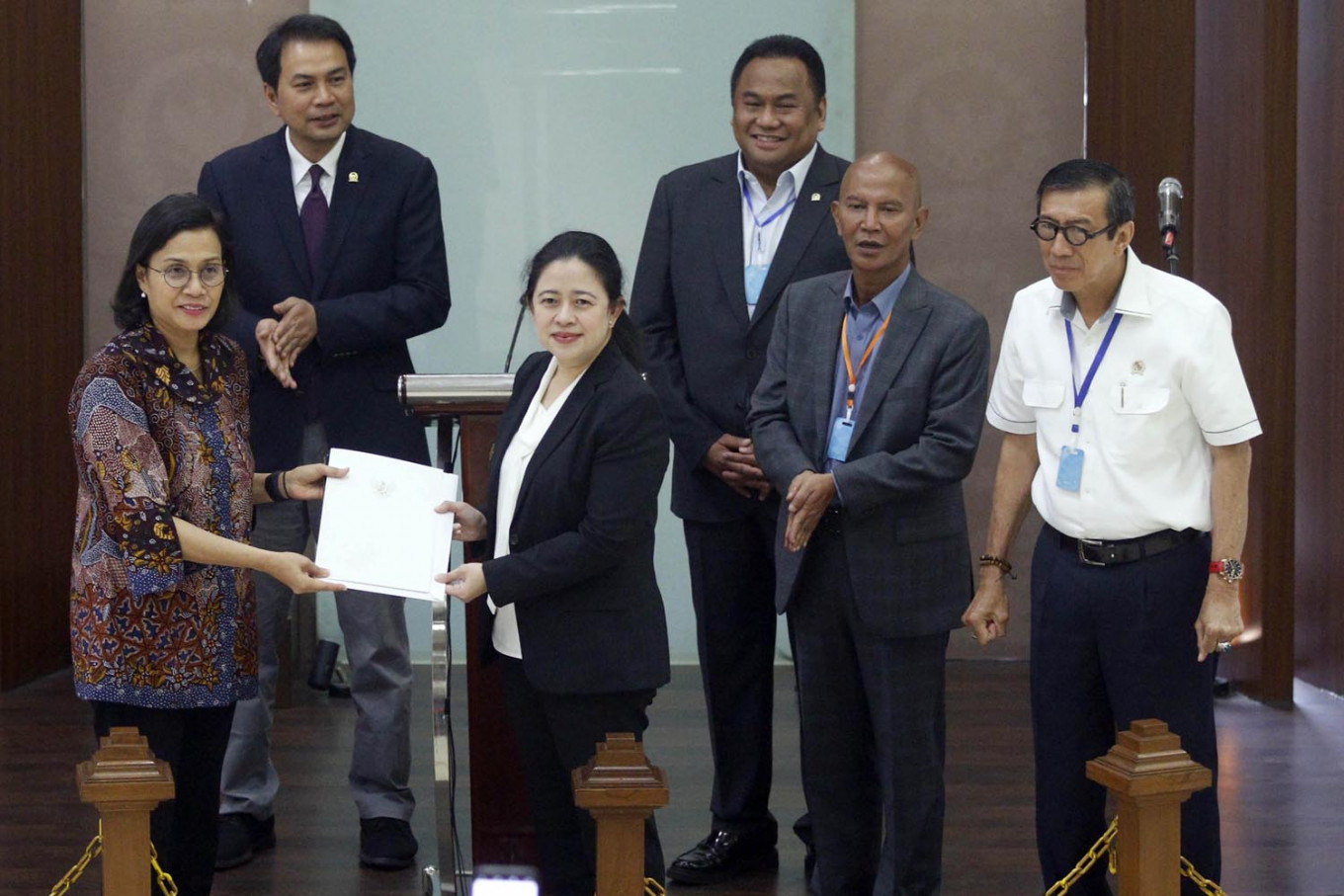Popular Reads
Top Results
Can't find what you're looking for?
View all search resultsPopular Reads
Top Results
Can't find what you're looking for?
View all search resultsPerppu on COVID-19 aid puts graft fight at stake
The regulation in lieu of law, Perppu No. 1/2020, is expected to be passed this week after the House’s budget committee grants approval amid mounting public pressure to drop it entirely.
Change text size
Gift Premium Articles
to Anyone
A
s the House of Representatives prepares to pass an executive order that will expand the government’s authority to allocate emergency coronavirus spending, legal experts warn that the new regulation would be a blow to the country’s fight against corruption.
The regulation in lieu of law, Perppu No. 1/2020, is expected to be passed this week after the House’s budget committee grants approval amid mounting public pressure to drop it entirely.
Read also: Lawmakers agree to endorse Perppu on COVID-19 in next plenary session
The Perppu will allow the government to extend the state budget deficit beyond the legal cap of 3 percent of gross domestic product and allocate the spending to programs related to COVID-19, while officials are protected from any legal charges as long as they act “in good will and according to the law”.
Gadjah Mada University Center for Anticorruption Studies (Pukat UGM) director Zainal Arifin Mochtar said emergency situations like the pandemic often required expansion of the President’s authority to take over lengthy bureaucratic processes.
But where the Perppu could become a big problem for the country, he said, was Article 27 of the regulation, which stipulates that any programs related to coronavirus aid are considered to be “economic costs to save the economy from crisis” instead of state losses. The article also shields government officials from any legal charges behind the argument that they have acted in good will.
“[The article] contradicts the definition of state losses in the 2004 State Treasury Law. The Perppu also does not define what constitutes ‘good will’,” he told The Jakarta Post.
He further cited as an example that the term “good will” was also used in Article 45 of the 2009 Bank Indonesia (BI) Law, which stipulates that the central bank’s governor and other bank officials are protected as long as they act in good will. But there are conditions that apply to define what acts or policies are carried out in good will.
It was because of these limitations, he said, that former BI deputy governor Budi Mulya was sentenced to 10 years in the Bank Century bailout scandal.
The government is seeking to disburse Rp 405.1 trillion (US$24.6 billion) for COVID-19 relief measures, most of which would be granted for economic recovery instead of healthcare spending. If the Perppu can be passed before mid-year, the government can allocate a larger fund for coronavirus aid in this year’s state budget through a presidential decree, instead of House approval.
While the emergency measures are needed, the public has condemned the absence of government oversight in the regulation. The Constitutional Court is currently reviewing the controversial articles in the Perppu under a petition filed by a group of anticorruption activists.
Read also: Angered by Perppu on pandemic response, civil groups turn to Constitutional Court
Violla Reininda, a constitutional law expert of judicial and constitution watchdog Kode Inisiatif, said the impunity given to state officials would protect them from any graft charges stipulated in the 2001 Corruption Law, as well as overriding judicial authorities as stipulated in the Constitution.
“Yes, we are currently in a state of emergency, but should the government undermine the Constitution in times of crisis? I don’t think so. Because Article 1 of the 1945 Constitution states that Indonesia is a nation governed by law,” she said.
Another legal expert, Refly Harun, said the impunity article gave the opportunity to “free riders” who wanted to take advantage of the emergency situation to rob the state coffers.
“Imagine that lawyers [of graft suspects] would say the court could not sue defendants since all spending ruled under the Perppu would not be considered state losses,” he said.
The experts have reasons to doubt the government officials since early disbursement of coronavirus aid in the capital and several provinces has been used by regional heads as an opportunity to increase their popularity among voters. Several incumbents are seeking reelection in a round of regional elections that will be held in December.
Bivitri Susanti of the Jentera School of Law said the House could only accept or reject the Perppu entirely since the legal mechanism did not allow revision of the current Perppu document.
“If the House factions agree, it is likely the Perppu will pass. But it can still be revised through a judicial review at the Constitutional Court or if the House proposes an amendment after the Perppu is passed,” she said.
Bivitri suggested that the public file a new judicial review petition should the Perppu be passed into law.
Constitutional Court spokesperson Fajar Laksono said the court could revoke the Perppu if justices can issue their rulings in favor of the plaintiffs before the House passes the Perppu. But if it passes, the public can still challenge the law.
“The public can still challenge the Perppu [after House deliberation] by registering new lawsuits,” Fajar said.
Boyamin Saiman, one of the plaintiffs challenging the Perppu, said he was “more than ready” to file another suit with the court if the House finally passes the regulation into law.
“We will be happy [if the Perppu becomes law] because we will not only be fighting against the government, but also the House,” Boyamin said. “The ongoing legislation process of the Perppu has also provided us more time to gather evidence and documents to be presented at hearings,” he added.










